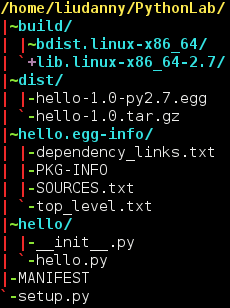If you use RouteFlow before, you will notice that the routing software it installs is Quagga by default. So, how to change to Xorp in RouteFlow? Here is an example for rftest2 case to do this. I assume the current path is under RouteFlow's directory.
1. Add new configuration files in rftest/config for rfvmA to rfvmD:
rftest/config/rfvmA/rootfs/usr/etc/xorp.conf
protocols {
ospf4 {
router-id: 1.1.1.1
area 0.0.0.0 {
interface eth2 {
vif eth2 {
address 10.0.0.1 {
}
}
}
}
area 0.0.0.1 {
interface eth3 {
vif eth3 {
address 30.0.0.1 {
}
}
}
}
area 0.0.0.4 {
interface eth4 {
vif eth4 {
address 50.0.0.1 {
}
}
}
}
export: "redis.connect"
}
}
policy {
policy-statement "redis.connect" {
term connect {
from {
protocol: "connected"
}
}
}
}
fea {
unicast-forwarding4 {
}
}
interfaces {
interface eth1 {
description: "eth1"
vif eth1 {
address 172.31.1.1 {
prefix-length: 24
}
}
}
interface eth2 {
description: "eth2"
vif eth2 {
address 10.0.0.1 {
prefix-length: 24
}
}
}
interface eth3 {
description: "eth3"
vif eth3 {
address 30.0.0.1 {
prefix-length: 24
}
}
}
interface eth4 {
description: "eth4"
vif eth4 {
address 50.0.0.1 {
prefix-length: 24
}
}
}
interface lo {
vif lo {
address 1.1.1.1 {
prefix-length: 32
}
}
}
}
rftest/config/rfvmB/rootfs/usr/etc/xorp.conf
protocols {
ospf4 {
router-id: 2.2.2.2
area 0.0.0.0 {
interface eth2 {
vif eth2 {
address 10.0.0.2 {
}
}
}
}
area 0.0.0.2 {
interface eth3 {
vif eth3 {
address 40.0.0.2 {
}
}
}
}
export: "redis.connect"
}
}
policy {
policy-statement "redis.connect" {
term connect {
from {
protocol: "connected"
}
}
}
}
fea {
unicast-forwarding4 {
}
}
interfaces {
interface eth1 {
description: "eth1"
vif eth1 {
address 172.31.2.1 {
prefix-length: 24
}
}
}
interface eth2 {
description: "eth2"
vif eth2 {
address 10.0.0.2 {
prefix-length: 24
}
}
}
interface eth3 {
description: "eth3"
vif eth3 {
address 40.0.0.2 {
prefix-length: 24
}
}
}
interface lo {
vif lo {
address 2.2.2.2 {
prefix-length: 32
}
}
}
}
rftest/config/rfvmC/rootfs/usr/etc/xorp.conf
protocols {
ospf4 {
router-id: 3.3.3.3
area 0.0.0.1 {
interface eth3 {
vif eth3 {
address 30.0.0.3 {
}
}
}
}
area 0.0.0.3 {
interface eth2 {
vif eth2 {
address 20.0.0.3 {
}
}
}
}
export: "redis.connect"
}
}
policy {
policy-statement "redis.connect" {
term connect {
from {
protocol: "connected"
}
}
}
}
fea {
unicast-forwarding4 {
}
}
interfaces {
interface eth1 {
description: "eth1"
vif eth1 {
address 172.31.3.1 {
prefix-length: 24
}
}
}
interface eth2 {
description: "eth2"
vif eth2 {
address 20.0.0.3 {
prefix-length: 24
}
}
}
interface eth3 {
description: "eth3"
vif eth3 {
address 30.0.0.3 {
prefix-length: 24
}
}
}
interface lo {
vif lo {
address 3.3.3.3 {
prefix-length: 32
}
}
}
}
rftest/config/rfvmD/rootfs/usr/etc/xorp.conf
protocols {
ospf4 {
router-id: 4.4.4.4
area 0.0.0.2 {
interface eth2 {
vif eth2 {
address 40.0.0.4 {
}
}
}
}
area 0.0.0.3 {
interface eth3 {
vif eth3 {
address 20.0.0.4 {
}
}
}
}
area 0.0.0.4 {
interface eth4 {
vif eth4 {
address 50.0.0.4 {
}
}
}
}
export: "redis.connect"
}
}
policy {
policy-statement "redis.connect" {
term connect {
from {
protocol: "connected"
}
}
}
}
fea {
unicast-forwarding4 {
}
}
interfaces {
interface eth1 {
description: "eth1"
vif eth1 {
address 172.31.4.1 {
prefix-length: 24
}
}
}
interface eth2 {
description: "eth2"
vif eth2 {
address 40.0.0.4 {
prefix-length: 24
}
}
}
interface eth3 {
description: "eth3"
vif eth3 {
address 20.0.0.4 {
prefix-length: 24
}
}
}
interface eth4 {
description: "eth4"
vif eth4 {
address 50.0.0.4 {
prefix-length: 24
}
}
}
interface lo {
vif lo {
address 4.4.4.4 {
prefix-length: 32
}
}
}
}
2. Modify the "rftest/create" shell script
chroot $LXCDIR/base/rootfs apt-get -y --force-yes install
xorp quagga libboost-thread-dev libboost-system-dev libboost-filesystem-dev libboost-program-options-dev rsyslog vlan tcpdump
chroot $LXCDIR/base/rootfs usermod -a -G xorp root
chroot $LXCDIR/rfvmA/rootfs usermod -a -G xorp root
chroot $LXCDIR/rfvmB/rootfs usermod -a -G xorp root
chroot $LXCDIR/rfvmC/rootfs usermod -a -G xorp root
chroot $LXCDIR/rfvmD/rootfs usermod -a -G xorp root
3. Modify the "rftest/rftest2" shell script
SCRIPT_NAME="
rftest_xorp"
...
...
echo "#!/bin/sh" > /var/lib/lxc/rfvmA/rootfs/root/run_rfclient.sh
echo "sleep 3" >> /var/lib/lxc/rfvmA/rootfs/root/run_rfclient.sh
if [ "$SCRIPT_NAME" == "rftest_xorp" ]
then
echo "sudo xorp_rtrmgr" >> /var/lib/lxc/rfvmA/rootfs/root/run_rfclient.sh
else
echo "/etc/init.d/quagga start" >> /var/lib/lxc/rfvmA/rootfs/root/run_rfclient.sh
fi
echo "/opt/rfclient/rfclient > /var/log/rfclient.log" >> /var/lib/lxc/rfvmA/rootfs/root/run_rfclient.sh
echo "#!/bin/sh" > /var/lib/lxc/rfvmB/rootfs/root/run_rfclient.sh
echo "sleep 3" >> /var/lib/lxc/rfvmB/rootfs/root/run_rfclient.sh
if [ "$SCRIPT_NAME" == "rftest_xorp" ]
then
echo "sudo xorp_rtrmgr" >> /var/lib/lxc/rfvmB/rootfs/root/run_rfclient.sh
else
echo "/etc/init.d/quagga start" >> /var/lib/lxc/rfvmB/rootfs/root/run_rfclient.sh
fi
echo "/opt/rfclient/rfclient > /var/log/rfclient.log" >> /var/lib/lxc/rfvmB/rootfs/root/run_rfclient.sh
echo "#!/bin/sh" > /var/lib/lxc/rfvmC/rootfs/root/run_rfclient.sh
echo "sleep 3" >> /var/lib/lxc/rfvmC/rootfs/root/run_rfclient.sh
if [ "$SCRIPT_NAME" == "rftest_xorp" ]
then
echo "sudo xorp_rtrmgr" >> /var/lib/lxc/rfvmC/rootfs/root/run_rfclient.sh
else
echo "/etc/init.d/quagga start" >> /var/lib/lxc/rfvmC/rootfs/root/run_rfclient.sh
fi
echo "/opt/rfclient/rfclient > /var/log/rfclient.log" >> /var/lib/lxc/rfvmC/rootfs/root/run_rfclient.sh
echo "#!/bin/sh" > /var/lib/lxc/rfvmD/rootfs/root/run_rfclient.sh
echo "sleep 3" >> /var/lib/lxc/rfvmD/rootfs/root/run_rfclient.sh
if [ "$SCRIPT_NAME" == "rftest_xorp" ]
then
echo "sudo xorp_rtrmgr" >> /var/lib/lxc/rfvmD/rootfs/root/run_rfclient.sh
else
echo "/etc/init.d/quagga start" >> /var/lib/lxc/rfvmD/rootfs/root/run_rfclient.sh
fi
echo "/opt/rfclient/rfclient > /var/log/rfclient.log" >> /var/lib/lxc/rfvmD/rootfs/root/run_rfclient.sh
4. Then, you can execute the script file: "create" and "rftest"
5. Verify ==> for instance, rfvmD
sudo lxc-console -n rfvmD
ubuntu@rfvmD:~$ sudo xorpsh
[sudo] password for ubuntu:
Welcome to XORP on rfvmD
root@rfvmD> show ospf4 neighbor
Address Interface State ID Pri Dead
40.0.0.2 eth2/eth2 Full 2.2.2.2 128 38
20.0.0.3 eth3/eth3 Full 3.3.3.3 128 39
50.0.0.1 eth4/eth4 Full 1.1.1.1 128 39
root@rfvmD> show interfaces
eth2/eth2: Flags:<ENABLED,BROADCAST,MULTICAST> mtu 1500 speed 1 Gbps
inet 40.0.0.4 subnet 40.0.0.0/24 broadcast 40.0.0.255
physical index 161
ether 2:d2:d2:d2:d2:d2
eth3/eth3: Flags:<ENABLED,BROADCAST,MULTICAST> mtu 1500 speed 1 Gbps
inet 20.0.0.4 subnet 20.0.0.0/24 broadcast 20.0.0.255
physical index 163
ether 2:d3:d3:d3:d3:d3
eth4/eth4: Flags:<ENABLED,BROADCAST,MULTICAST> mtu 1500 speed 1 Gbps
inet 50.0.0.4 subnet 50.0.0.0/24 broadcast 50.0.0.255
physical index 165
ether 2:d4:d4:d4:d4:d4
lo/lo: Flags:<ENABLED,LOOPBACK> mtu 16436 speed unknown
inet 4.4.4.4 subnet 4.4.4.4/32
physical index 168
root@rfvmD>



